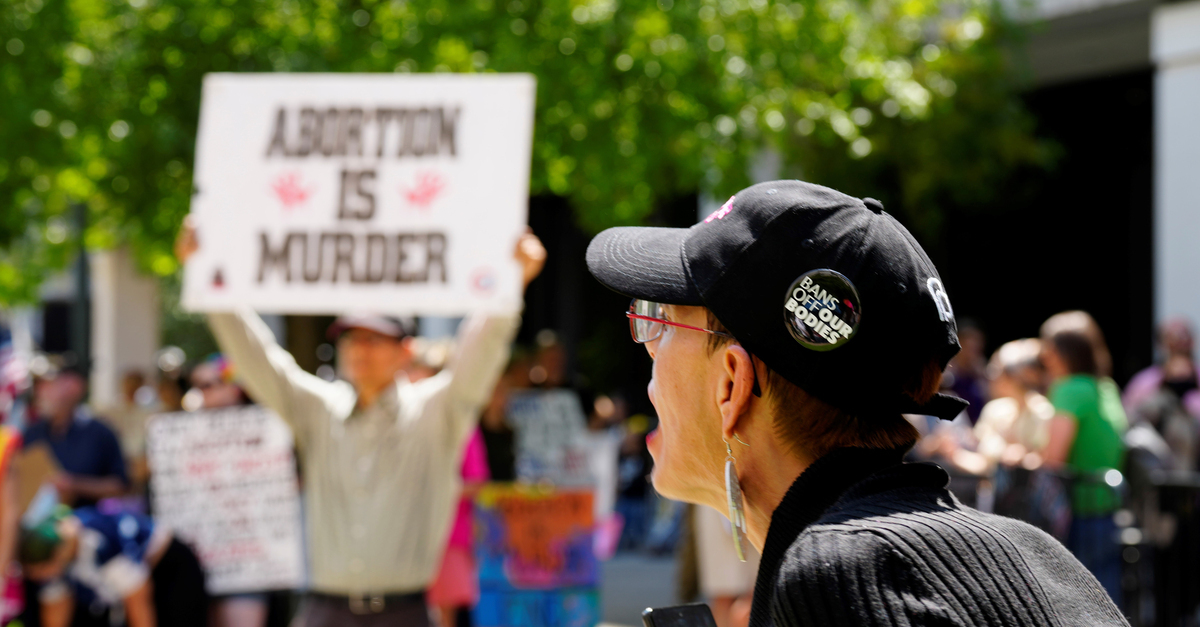
A woman supporting abortion rights shouts at anti-abortion protesters outside the South Carolina Statehouse on Thursday, July 7, 2022, in Columbia, S.C. Protesters clashed outside a legislative building, where lawmakers were taking testimony as they consider new restrictions on abortion in the wake of the U.S. Supreme Court’s decision overturning of Roe v. Wade. (AP Photo/Meg Kinnard)
Seventeen Republican lawmakers in South Carolina sponsored a bill that would redefine “person” under the state’s criminal law to include a fertilized egg. Should the measure pass, it would mean that under the state’s penal code, a pregnant person who undergoes an abortion could be subject to all applicable punishments, including the death penalty. Since the Supreme Court overruled Roe v. Wade last June, South Carolina has been among the most aggressive states to restrict abortion.
The bill is H. 3549, known as the South Carolina Prenatal Equal Protection Act of 2023, and it proposes a number of changes to the Palmetto State’s homicide statute. Specifically, it provides:
The word “person” includes an unborn child at every stage of development from fertilization until birth.
The word “fertilization” means the fusion of a human spermatozoon with a human ovum.
Existing homicide law in South Carolina already includes a crime “that causes the death of, or bodily injury to, a child who is in utero at the time that the violent crime was committed.” Under a standard reading of the proposed statute, the Prenatal Equal Protection Act would mean that terminating a pregnancy would give rise to a substantially similar scope of liability as would the killing of a person who has been born alive. Further, the bill’s title indicates that its purpose is to treat fertilized embryos on par with individuals born alive under the law.
The bill does carve out some narrow exceptions. It provides an exception for a pregnant person who underwent an abortion “because she was compelled to do so by the threat of imminent death or great bodily injury,” as well as an exception for an abortion necessary to prevent the death of a mother “when all reasonable alternatives to save the life of the unborn child were attempted or none were available.” No exception, however, is made for pregnancy that results from rape or incest.
The bill also explains that it is not retroactive.
Chairman of the South Carolina “Freedom Caucus” Rob Harris (R-Spartanburg)— a registered nurse— first introduced the bill.
Harris could not be reached for comment Tuesday, but at the time the bill was first introduced, Harris said, “If we call it life and define it as life, then why should anyone, not just mothers, why should anybody be able to take that life? If it’s life it needs to be protected like any other life.”
In addition to Harris, the bill is sponsored by Republican Representatives Harris, Mike Burns, Bill Chumley, Jordan Pace, Roger Nutt, Thomas Beach, Stewart Jones, Brian White, Steven Long, David O’Neal, Josiah Magnuson, Mark Willis, Ryan McCabe, Ashley Trantham, Jay Kilmartin, Brandon Guffey and Ronnie Cromer.
The current membership of the South Carolina House is made up of 88 Republicans and 36 Democrats. Not all Republicans, however, support the proposed bill. Five Republicans who had initially sponsored the bill — David Vaughan, Fawn Pedalino, Brian Lawson, Randy Ligon, Patrick Haddon — removed their names as sponsors after Monday’s legislative session.
Rep. Nancy Mace, a Republican who represents South Carolina in Congress, spoke on the U.S. House floor about the South Carolina Prenatal Equal Protection Act of 2023 in the days leading up to Monday’s legislative session. Mace called the bill “deeply disturbing to [her] as a woman, as a female legislator, as a mom, and as a victim of rape.”
“This debate ought to be a bipartisan debate where we balance the rights of women and we balance the right to life, but we aren’t having that conversation,” said Mace.
The issue of whether a fetus can be considered a “person” for legal purposes is one that the Supreme Court has declined to answer to date.
Have a tip we should know? [email protected]

